What times these are.
Democracy is in peril these days, but could have been destroyed along with former president Donald Trump but for a half-inch difference in the trajectory of the bullet almost surely captured in by Doug Mills’ 30-frames-per-second, 1/8,000 second shutterspeed camera for The New York Times.
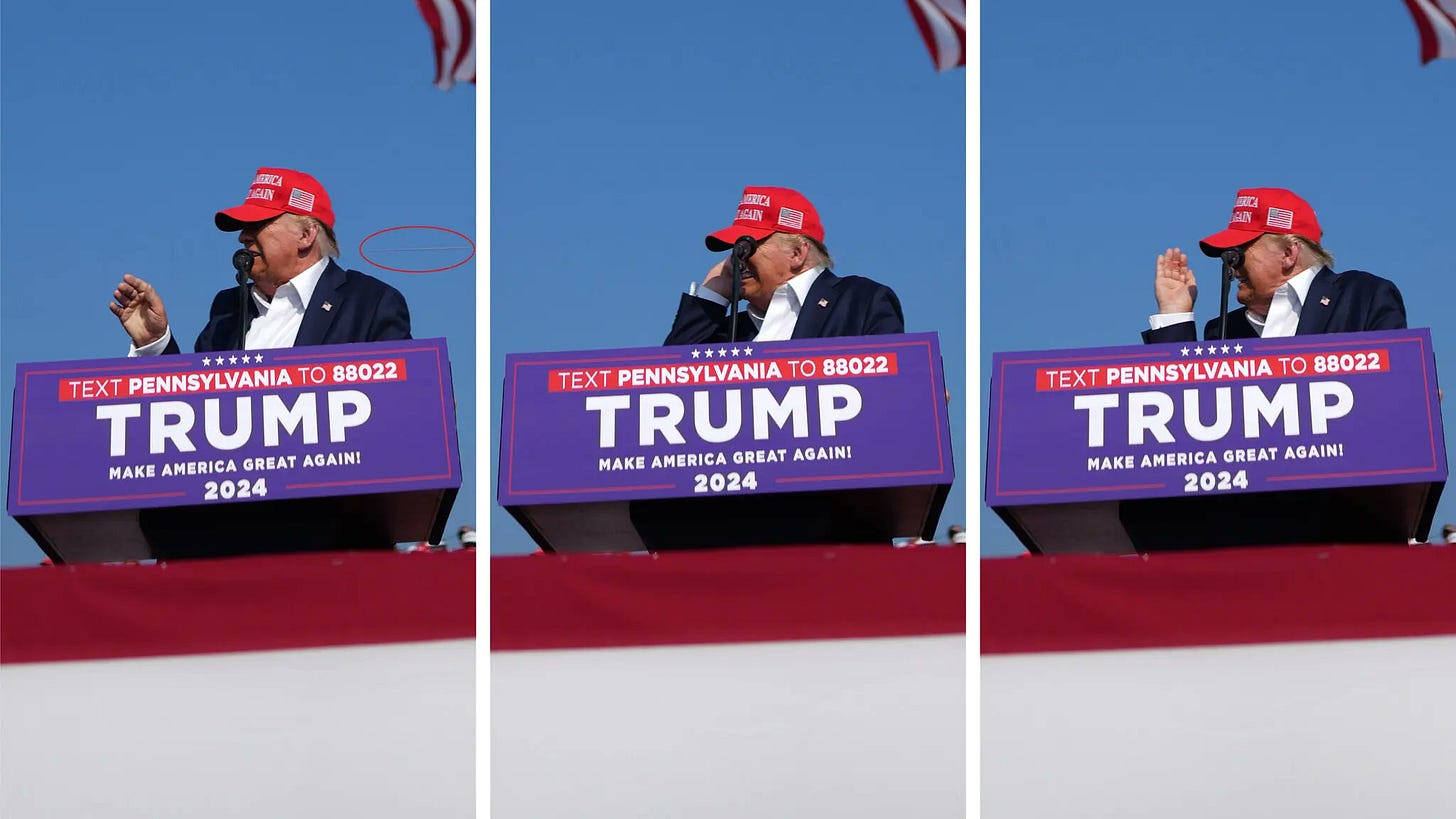
Longtime media analyst
said something valuable on X over the weekend as pundits and bots rushed to fill the information gap after a 20-year-old would-be assassin’s bullets killed a Trump rally attendee, badly wounded two others and just missed killing candidate Trump:Don't be fooled by the social media freak show: The vast majority of Americans have so much in common. We're not at each other's throats over Trump and Biden. We're not in the political arena at all. We're on the porch, at the pool, in the pews. We're not fighting On Here.
When you see America the way it actually is – Republicans baking bread for Democrats, liberals fixing flat tires for conservatives, most of us just trying to live peacefully despite our differences – you see how distorted and destructive the online conversation can be.
I reposted it with this hopeful vision:
Every day in purple Downeast Maine this is reality. There are lots of Trump signs and stickers and lots of lifetime Democrats (including both within my inlaw family). We debate and respect and move forward. Town meetings are a marvel. School budgets routinely pass on a unanimous cards-raised vote.
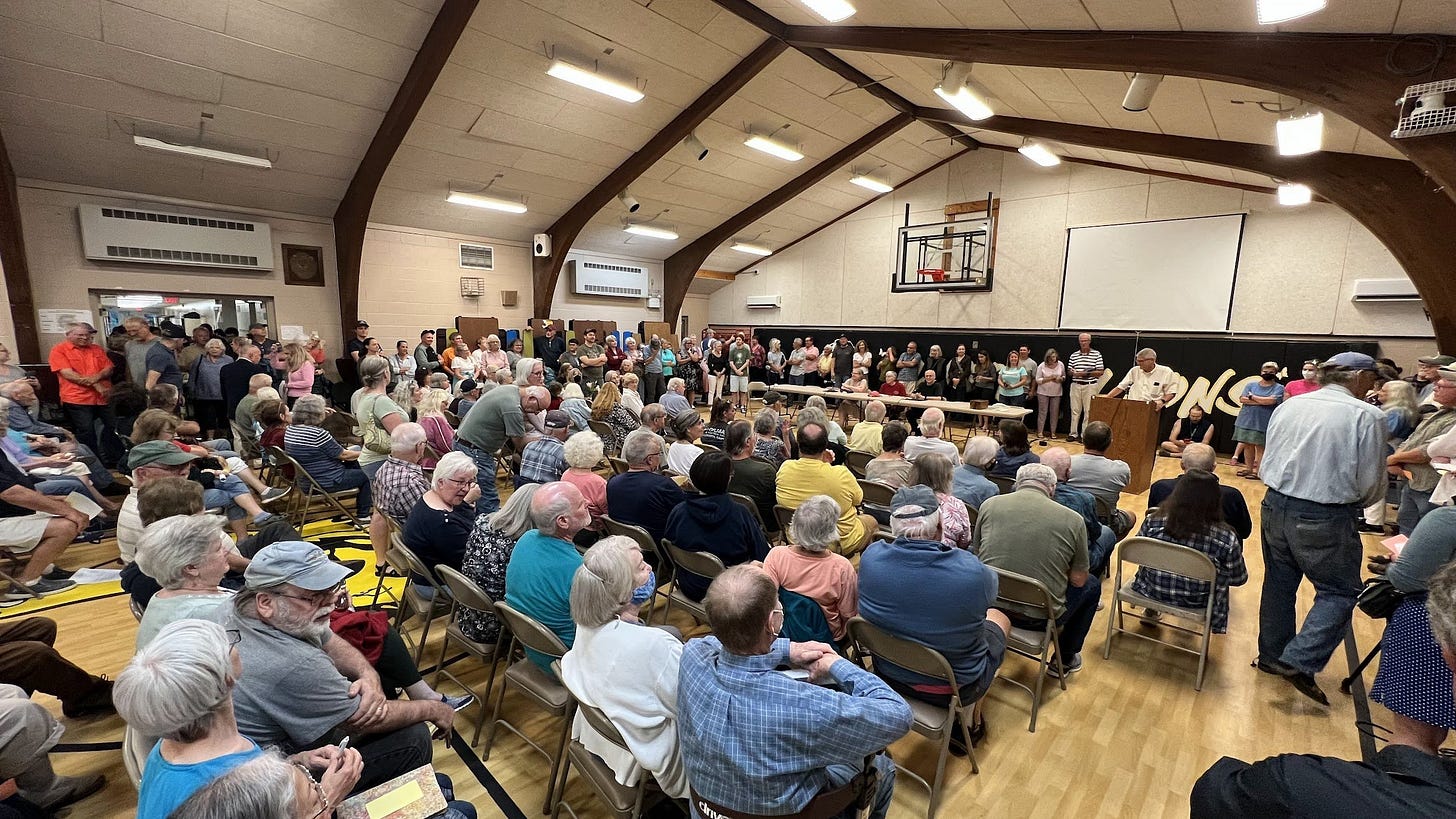
Yes, there’s plenty to argue about in both Brian’s stance and mine (he’s made divisive comments before, as have I, and Maine is the antithesis of diversity, both racially and demographically). But I sense you get the point.
There are paths to cooperation and respect amid deep difference, and - in person or online - there are strategies that can move conversations either in a constructive or destructive direction. Elected and community leaders have a choice to make every day facing that reality. That’s true even for bullet-grazed Trump.
As I tweeted yesterday, the momentous shooting in Pennsylvania can lead to “either a tipping point toward true unraveling or a pinch point that can be navigated if Trump's team chooses moderacy over feeding its already-committed base.”
Is this a tipping point or navigable pinch point?
Trump’s base is going nowhere. Given that the party conventions mark the start of the general election campaign, it’s standard practice for candidates to pivot to moderation to harvest votes of doubtful or distracted voters who are less passionate.
In an exclusive interview with Salena Zito for the conservative Washington Examiner, Trump said this:
“The speech I was going to give on Thursday was going to be a humdinger… Had this not happened, this would’ve been one of the most incredible speeches” aimed mostly at the policies of President Joe Biden. “Honestly, it’s going to be a whole different speech now.”
At the same time, of course, a legion of Republicans jumped on the shooting to intensify “us/them” attacks on Democrats, so we’ll see how that goes….
But there’s a role here for everyone, at every level, to choose how to frame conversations and messages. With that in mind I’m reposting several Sustain What conversations that took place in the turbulent months when the pandemic, George Floyd protests and January 6th insurrection created a chaotic crescendo.
The show above, Pathways to Impact in Perilously Polarized Times, featured a marvelous array of minds and voices:
Peter T. Coleman, a professor of psychology and education at Columbia University, will discuss lessons from his new book, “The Way Out - How to Overcome Toxic Polarization.”
Coleman holds a joint appointment at Teachers College and the Earth Institute and directs two research centers. He is also the author of “Making Conflict Work: Harnessing the Power of Disagreement” (2014) and “The Five Percent: Finding Solutions to Seemingly Impossible Conflicts” (2011), among other books.
He says “The Way Out - How to Overcome Toxic Polarization,” is “about why we are stuck in our current cultural riptide and what we can do to find our way out. It will explain how patterns of intractable polarization can and do change, and offer a set of principles and practices for navigating and healing the more difficult divides in your home, workplace and community.”
Reggie Harris, a longtime folk singer and songwriter, storyteller and educator who has worked and sung for racial understanding, human rights and justice for decades. He’ll speak about his experiences at the interface of love and hate, Black and White and maybe sing a song or two.
He describes his album from that time, “On Solid Ground,” as a “call for personal and national grounding in the explosion of racial and civil unrest and the growing worldwide death spiral that was 2020.” Please also check out Harris’s new memoir, “Searching for Solid Ground.”
A MAGA BLM Faceoff
Here’s a particularly apt excerpt - Harris talking about a heated confrontation he had when Black Lives Matter and MAGA protests coincided on a town green in conservative Cobleskill in upstate New York:
Other guests were:
Andy Norman, who teaches philosophy and directs the Humanism Initiative at Carnegie Mellon University. He says his focus is studying how ideologies short-circuit minds and corrupt moral understanding and developing tools that help people reason together in more fruitful ways.
Norman will describe insights offered in his new book, “Mental Immunity: Infectious Ideas, Mind-Parasites, and the Search for a Better Way to Think."
Amanda Ripley, a solutions-focused journalist and bestselling author who has become a champion of a new style of journalism sifting less for sound bites and more for pathways to insight amid complexity.
Her latest book is “High Conflict: Why We Get Trapped and How We Get Out.” Here’s Ripley’s summary of this concept: “When we are baffled by the insanity of the ‘other side’—in our politics, at work, or at home—it’s because we aren’t seeing how the conflict itself has taken over. That’s what ‘high conflict’ does. People do escape high conflict. Individuals—even entire communities—can short-circuit the feedback loops of outrage and blame, if they want to. This is a mind-opening new way to think about conflict that will transform how we move through the world.”
Isaac Grosof, who at the time was a Carnegie Mellon grad student running the Humanist League and is now a postdoctoral research associate at the University of Illinois, Urbana-Champaign.
More Sustain What conversations on finding common ground and traction
Just before the 2020 election I ran a related conversation with Peter Coleman, Amanda Ripley and folk singer Reggie Harris, but that show also remarkably included Wallis Wickham Raemer, an educator who is a distant, and white relative of Harris’s. His lineage goes back to a slave holder, Williams Carter Wickham, who was among those whose statues were being removed across the South. (There’s a fantastic New York Times story about the Wickhams.)
Finally, here’s a magical Sustain What 2022 conversation on “peace speech,” centering on the experience and skills built through Pádraig Ó Tuama’s many years as a mediator, gay rights voice, theologian and poet on the front lines during Ireland’s “troubles.”
Pádraig Ó Tuama & Friends on Language as a Conflict Trap or Peace Pathway
My other guests were Reggie Harris (yes, Reggie again; he is a dear friend and musical compadre from my Hudson River Valley days) and Irene O’Garden – a poet, educator and author, most recently, of the book of essays “Glad to Be Human” (and a friend).
At the time, Ó Tuama was in residence at Columbia University working with Coleman’s "Peace Speech" project with support from the Morton Deutsch International Center for Cooperation and Conflict Resolution (MD-ICCCR), Teachers College, and the Climate School at Columbia University, Coleman and Ó Tuama teamed up to explore the power of language when it comes to promoting peace, security, and sustainability across the globe.
Postscript
As a postscript, I’m adding this vital column on conventions and the news media from Mark Jacob - veteran newspaper editor and now media critic. It’s one thing to reach for common ground, but another to amplify lies and hate where they exist. Make sure to ride your news media hard if you see missteps.


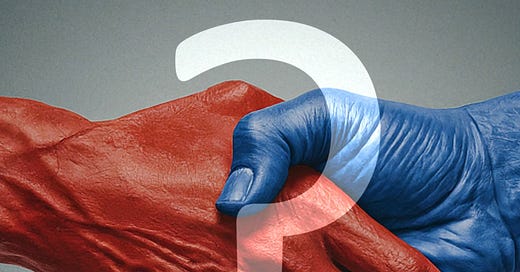





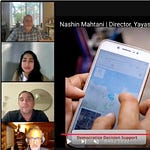



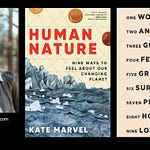
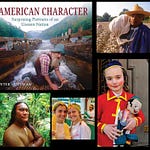


Share this post